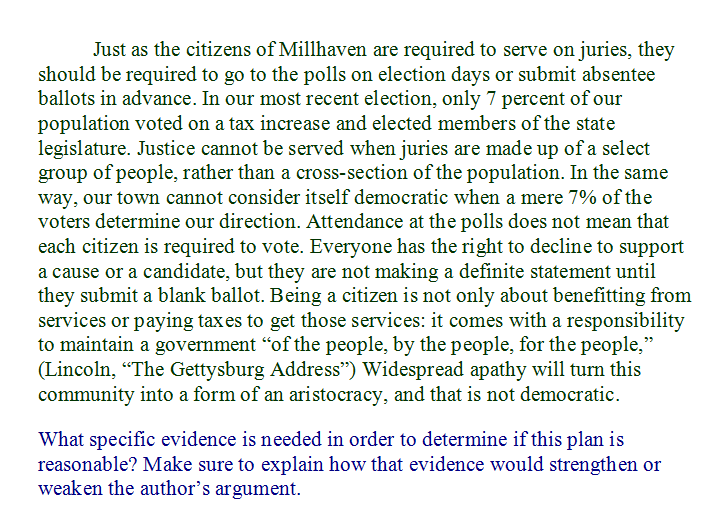14. Sample "Analyze an Argument" Essay

A Sample Response:
In this passage, the author argues that voting in Millhaven should be mandatory and bases that claim on data from one recent election. When considering that election's low voter turnout rate, the author jumps to the conclusion that the town can no longer be considered democratic. This bold statement is most likely meant to alarm readers and emphasize the severity of the issue, but the author does not provide the evidence needed to make the statement valid. To solve this alleged problem, the author then proposes mandatory voting in all elections. The author compares that obligation to jury duty in order to prove that all citizens need to maintain a democratic government. However, this analogy does not prove that all eligible voters need to participate in an election in order for the process to be democratic. To make this argument's claim reasonable, this author not only needs to provide evidence that low voter turnout makes Millhaven undemocratic, but he/she also needs to prove that required voting will restore democracy to the town.
To draw the conclusion that Millhaven is no longer democratic, the author relies on data from a single election. In order to strengthen this argument, the author needs to consider elections over the past five or more years. Evidence of a consistently low or decreasing voter turnout rate would give readers proof that there is an ongoing problem with voter participation. If the election with the seven percent voter turnout rate were an outlier, however, the argument that the town is no longer democratic could easily be gainsaid. When the author refers to the government as "a form of an aristocracy, not a democracy," the author also assumes that voters in the last election were made up of an elite group of people in the town. Although the author makes that accusation, he/she never proves that those who participated in the election were part of one particular race, class, gender, or age group. If the author had added that each voter hailed from the highest tax bracket, he/she would then be able to highlight the point that the seven percent represent a select group of people. Without that data, however, the author's claims about elitism are unfounded. This evidence is crucial for supporting the claim that Millhaven is no longer a democratic town.
The author also needs to do additional research on causal evidence for the lack of voting. When referring to the latest election, the author assumes that most eligible voters did not participate due to indifference or disapproval, but the author never rules out alternative explanations. He/she needs to conduct a survey or poll to determine why most voters decided not to participate in the latest election. After all, the voting may have been held on an inconvenient date, or there may not have been enough information provided to residents about assigned polling places, issues, or candidates. If the author could rule out these factors and consider more than one election, the residents' disengagement could be accepted as a factor that contributed to the low voter turnout, and it would be reasonable to discuss ways to address it.
Even if the author adds enough evidence to prove that Millhaven is no longer democratic, he/she still needs readers to agree that mandatory voting could restore democracy to the town. In an effort to support this solution, the author compares voting to jury duty: "Justice cannot be served when juries are made up of a select group of people, rather than a cross-section of the population. In the same way, our town cannot consider itself democratic when a mere seven percent of the voters determine our direction" (Brainfuse GRE). Though citizens are required to be present for jury duty, juries are actually made up of a select group of people determined by each judge and teams of lawyers. The most unbiased jurors tend to be selected in order to make the trial fair while others are dismissed. This selection process shows the importance of finding citizens who are willing to make informed and unbiased decisions; it does not support the idea that a democracy requires all eligible citizens to vote. At the end of the passage, the author also cites Abraham Lincoln's famous "Gettysburg Address" in an attempt to support required participation in a democratic government, but he/she only clips a line from the speech without providing context or explaining why a high voter turnout is essential to a government "of the people, by the people, for the people." After all, only white, male property owners could vote at the time when the Gettysburg Address was delivered. Thankfully, most citizens now have the right to vote, but this passage does not prove that they should be forced to use it.
This argument's conclusion cannot be accepted as sound until the author provides more evidence for the reasoning behind it. To prove that this town's electoral process is not democratic, the author needs to gather data on more than one election in Millhaven. When researching the records, the author should also study the voter turnout rates, compare the populations of voters and non-voters, and determine what factors are making people decide to avoid the polls. If the electoral process does prove to be undemocratic, then the author still needs to show readers that a mandatory vote would restore democracy, rather than ruin it by forcing people to make a decision.